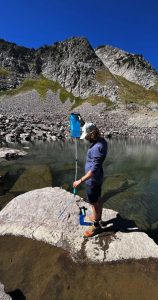When looking for portable water filters while backpacking, it can be hard to find the best product. There are many available and the process of choosing one can be stressful. Since clean water is essential while backpacking, you want to get a product that will meet your needs, be durable, reliable, and won’t break the bank. To help with this, we’ve put together some tips that you can use to find the best backpacking water filter for your outdoor adventures. In addition, we have listed out some of the best products on the market at different price ranges.
Types Of Filters Explained
You’ll want to consider the type of filter you want. There are many options available, so you want to understand the pros and cons of each type of filter. Some of the options are UV light, chemical drops or tablets, bottle filters, gravity filters, pump filters, and others. Each system has advantages and disadvantages, below, we will talk about each.
There are two main categories of filters: water purifiers, and water filters. Below, we will highlight each type, and the sub-types of filters within them.
Water Purifiers Vs Water Filters
Purifiers usually work by treating water with chemicals to kill all of the bad things. This is the most common method for treating water to avoid viruses. These chemicals, usually iodine or chlorine will also kill bacteria and protozoa.
Filters work by pushing water through a filtration system with small pores to filter out debris, bacteria, and all of the bad stuff. The smaller the pores, the more it can filter out. These types of filters are commonly used for backpacking as they effectively remove the most common bacteria (E. coli, Salmonella, Campylobacter and others), and harmful protozoans. When traveling abroad, or an areas where you may encounter virus infected water, it is important to have a system that can remove all types of harmful organisms.
Water filters generally don’t prevent viruses, though some filters do have that capability. Some systems are both filters and purifications systems, where they will take care of all bacteria, protozoa, and viruses.
Amazon’s Water Filters | Check REI | Check MSR
Pump Filters & Pump Purifiers
Pump filters work by using a pump to push water from the dirty source, and into a clean container. These filters can be combined with purifying techniques to remove even viruses. These are one of the most common filtration systems for backpackers.
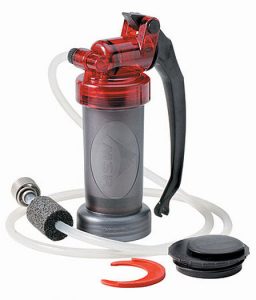
MSR Backpacking Pump Water Filter
Pros:
- You can filter a large volume pretty quickly (not as much volume as a gravity filter)
- Easy to filter exactly the amount of water you need
- Replaceable cartridges and filters
- Can get water from large or small sources.
Cons:
- Larger pack size (and slightly heavier)
- Pumping can take a fair amount of work to filter a lot of water
- Maintenance is needed (filter clearing) to ensure good pumping
Pump Filters On Amazon | Check REI
Gravity Filters & Gravity Purifiers
Gravity filters work by using a bag to scoop up water from a source, and then gravity pulls that water downwards, through your filter medium into a clean water container. These can be combined with purification techniques to clear out viruses as well.
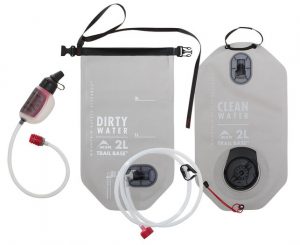
MSR Gravity Water Filter
Pros:
- Large quantities can be filtered
- No need to pump – just hang up your water
- Replaceable cartridges and filters
Cons:
- Need a place to hang your water
- Relatively slow process to filter
- Hard to scoop large quantities of water with a small source
- Maintenance is needed (filter clearing) to ensure good flow
Gravity Filters On Amazon | Check REI
Chemical Treatment
Chemicals are effective against protozoa, bacteria and viruses. Simply add the necessary amount to your water, and wait. Most systems are typically iodine or chlorine based. It is often available in drops, pills, mixes, or as part of a filtration system.
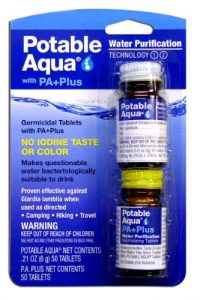
Iodine Water Purification Tablets
Pros:
- Very easy to use
- Least expensive filtration option
- Small pack size (everyone should carry as a backup)
Cons:
- Takes a long time – 30 minutes, up to around 4 hours to purify
- Leaves an often unwanted metallic taste (that can be reduced through other add-ins)
- Not for use by pregnant women or those with thyroid conditions
- Iodine doesn’t work for Cryptosporidium
Chemical Water Purifiers | Check REI
Squeeze & Bottle Filters
These systems work by simply filling a bag, or bottle with your water, and screwing on your cap. You can squeeze, or suck the water through your filter and immediately drink clean water. Some bottle systems also work with UV purifiers.
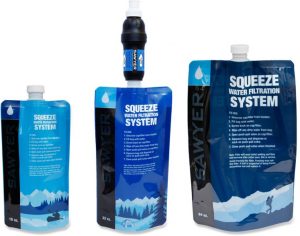
Sawyer Squeeze Backpacking Water Filter
Pros:
- Fast and easy. Can be drinking in a few seconds.
- Many of these filter systems double as a gravity filter – which allows the best of both worlds.
- Lightweight and small pack size
- Replaceable cartridges and filters
Cons:
- Low water quantities than other methods
- Maintenance is needed (filter clearing) to ensure good flow
Squeeze and Bottle Filters On Amazon | Check REI
Straw Filters
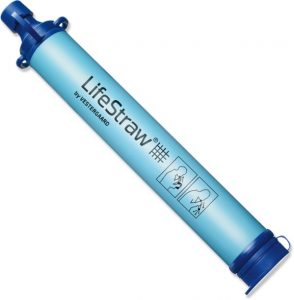
LifeStraw Water Filtration System
Straw filters work just like a straw. You stick one end into your water source, and you can drink clean water out of the other end.
Pros:
- Immediate availability of water form all sizes of a source.
- Very lightweight and cost effective
Cons:
- Small quantities of water only
- No storage of water – it is only available while you are at the source
- Some straw filters don’t have replaceable filters
Straw Filters On Amazon | Check REI
Ultraviolet (UV) Purifiers
UV treatment device is inserted into the water bottle cap, and left sitting for 60 seconds or so.
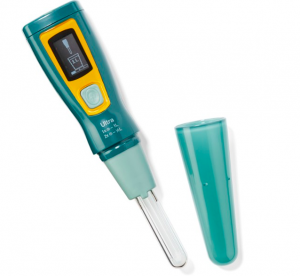
Steripen Ultra UV Water Purifier
Pros:
- Very lightweight and small
- No cleaning or maintenance needed
Cons:
- Only small water volumes at a time
- Murky or dirty water will not be effective. So pre-filtering water is necessary if water is cloudy.
- Extra batteries need to be carried.
UV Filters On Amazon | Check REI
Boiling – The Classic Method
We of course can’t forget the tried and true method of boiling. Water should be boiling for at least 1 minute. At elevations above 6,500 feet, your water should be boiling for at least 3 minutes.
Pros:
- No additional filters required
- Great backup method
Cons:
- Need to have canister with enough fuel for boiling
- Hard to boil large volumes of water.
- Need time to boil, as well as time to cool water.
Best Backpacking Water Filters
In this section, we are going to highlight several water filters that we have found, utilized, and consulted with other backpackers with, and have determined they are quality products.
Best Gravity Filters
These products have quality reviews, work consistently, and have flow rates through the filters that won’t leave you frustrated. They don’t really have moving parts, so all you need is a good hanging system, water collection system, and a solid filter with a fast flow rate. It is easy to get these three features on a budget in this category.
Waki Waki 3L Gravity Filter
This product is one of the cheapest options on the market, but has a super fast flow rate, easy hanging system, and packs up plenty small enough. For the price, we were amazed by the performance.
Flow Rate: 27 liters (7.13 gallons) per hour
Cost: $24.99
Capacity: 3 liters (0.79 gallons)
Item Weight: 2 Ounces
See On Amazon | See On WakiWaki
miniwell Gravity Water Filter
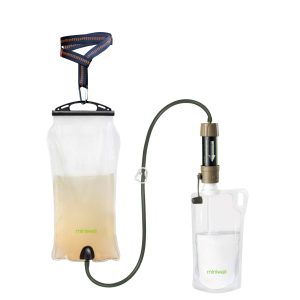 Yet again, this product is on the cheaper side compared to other water filters, but is super well designed, filters super quickly, and in our opinion, blew away the performance of high end water filters that our backpacking partners brought along. Between these two lesser expensive water filters, there really isn’t much of a need to spend more.
Yet again, this product is on the cheaper side compared to other water filters, but is super well designed, filters super quickly, and in our opinion, blew away the performance of high end water filters that our backpacking partners brought along. Between these two lesser expensive water filters, there really isn’t much of a need to spend more.
Flow Rate: 600 Milliliters Per Minute
Cost: $39.95 – $49.00
Best Squeeze Bottle Filters
In this category, there are dozens of options that will work great, and nearly all of them are budget friendly.
Sawyer Products Squeeze Water Filtration System
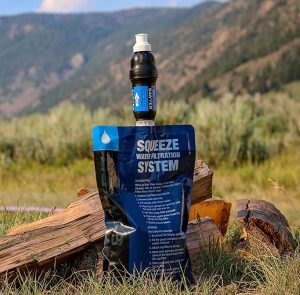 One of the most well renown offerings, and a product we are very familiar with and trust our lives with is Sawyer. These systems are so cheap, it makes sense to go with the most trusted brand.
One of the most well renown offerings, and a product we are very familiar with and trust our lives with is Sawyer. These systems are so cheap, it makes sense to go with the most trusted brand.
Weight: Less than 3 ounces
Filter Life: 100,000 gallons
Cost: $29.97 – $34.99
Best Pump Water Filters
This category tends to be the most expensive option for water filtration.
MSR MiniWorks EX Water Filter
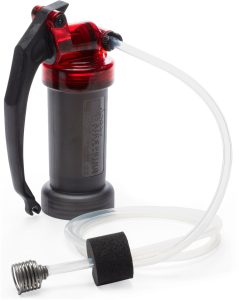 Again, we feel that users can go for more expensive options if they need to purify large quantities of water, but in our opinion, the best overall pump water filter for the price is the MSR MiniWorks
Again, we feel that users can go for more expensive options if they need to purify large quantities of water, but in our opinion, the best overall pump water filter for the price is the MSR MiniWorks
Filter Medium: Ceramic with carbon core
Pump Strokes Per Liter: 85
Dimensions: 7.8 x 3.8 inches
Weight: 4.6 ounces
Cost: $100-$125
MSR Guardian Purifier
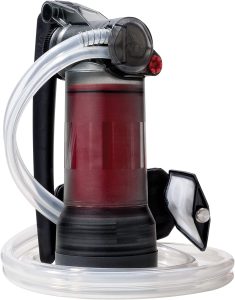 If price is not of concern, and you are looking for extremely fast flow rates, and the most purified water, go with the MSR Guardian Purifier. It is expensive at nearly $400 but extremely high quality. This filters more, and pumps faster than the MSR MiniWorks, but it does weight more.
If price is not of concern, and you are looking for extremely fast flow rates, and the most purified water, go with the MSR Guardian Purifier. It is expensive at nearly $400 but extremely high quality. This filters more, and pumps faster than the MSR MiniWorks, but it does weight more.
Filter Medium: Advanced hollow fibers
Pump Strokes Per Liter: 35
Dimensions: 8.2 x 4.7 x 3.5 inches
Weight: 1 lb. 1.3 oz.
Cost: $100-$125
Other Considerations
Water Quantity
If you are filtering water just for yourself, you need less water. If you have filter just as a backup in case you need more water, that is also a different use case. Some also may be in charge of gathering water for a camp or large group in which you need to be able to filter large quantities. Squeeze to drink filters, pump filters, or smaller gravity and bag filters are great for yourself. Straw or bottle filters are fantastic as emergency backups for yourself on day hikes, and large gravity filters are best to filter large quantities for a group of people.
Speed of Filtration
Pump, squeeze to drink, and gravity filters work pretty fast. You’ll get water very quickly. Chemical purifiers can take between 30 minutes to a few hours to effectively neutralize water. Simply, know your situation, and how fast you’ll need to get water to choose the right system.
Effectiveness
One of the most important things about getting a backpacking water filter is how effective it is. Besides drinking clean water, you want to make sure the filter will remove any harmful ingredients. There are quite a few pathogens that can live in water and cause some pretty severe issues. In order to ensure you don’t get sick, you’ll want to make sure the filter can take care of as many of these as possible. This is even more true for those that aren’t sure what kind of pathogens might be present in the area.
If you are traveling to a country where waterborne viruses are possible, you will need a filter or purifier with chemicals to kill viruses, or a filter rated to filter out viruses. In the U.S., many backpackers will bring filtration that kills bacteria and protozoa, but not viruses, since the most common waterborne illnesses in the U.S. can be handled by removing the bacteria and protozoa.
Traveling Location
Another consideration is the traveling location. Not only will you want to think about the actual location, but you’ll also want to consider what you’ll be doing and what part of the area you’ll be in. This information can give you a lot of insight, such as what kinds of pathogens are common and what kind of water is normal in the area. Some places might only have muddy sources, while others might have natural springs. Once you know this information, you’ll have an easier time finding the water filter that works the best for you and your needs.
Price
Some people might find that this consideration isn’t very important, but you also want to take price into consideration. This is even more true when you consider that some filters can be quite expensive. The last thing you want is to spend all kinds of money on a product that doesn’t even work for your situation. Try to figure out how much you want to spend and look at filters in that price range. If at all possible, try and have a little wiggle room so you can buy a more expensive filter if you need to.
Size
You’ll also want to consider the size of the filter. Most people who are backpacking don’t have a whole lot of extra room. They also don’t want to carry around a bag that ends up heavier than it needs to be. As a result, make sure you look at the size of the filter. To help you make a decision, you should look at the bags you’ll take with you and see how much room it already has, as well as how heavy they are. From there, you’ll be able to find a filter that isn’t too big or heavy. The great thing is that most filters are quite light and some are extremely compact.
Filter Media
Finally, consider what kind of media the filter is made out of. Common materials are fiberglass, ceramic, silica, and activated carbon. Each of these is great for certain types of water and some do a better job at filtering than others. If possible, try and research the types of water in the area you’ll be traveling so you can figure out what type of media you should get.
By using these tips, you should have a pretty good idea about what to look for when trying to decide on a portable water filter. You never know what kind of bacteria or disease water might have, so being able to filter them out is essential. The last thing you want is to become deathly sick while you’re backpacking, especially if you’re somewhere remote. Remember to do as much research as possible before making your final decision or purchase.
Max DesMarais is the founder of hikingandfishing.com. He has a passion for the outdoors and making outdoor education and adventure more accessible. Max is a published author for various outdoor adventure, travel, and marketing websites. He is an experienced hiker, backpacker, fly fisherman, backcountry skier, trail runner, and spends his free time in the outdoors. These adventures allow him to test gear, learn new skills, and experience new places so that he can educate others. Max grew up hiking all around New Hampshire and New England. He became obsessed with the New Hampshire mountains, and the NH 48, where he guided hikes and trail runs in the White Mountains. Since moving out west, Max has continued climbed all of the Colorado 14ers, is always testing gear, learning skills, gaining experience, and building his endurance for outdoor sports. You can read more about his experience here: hikingandfishing/about

